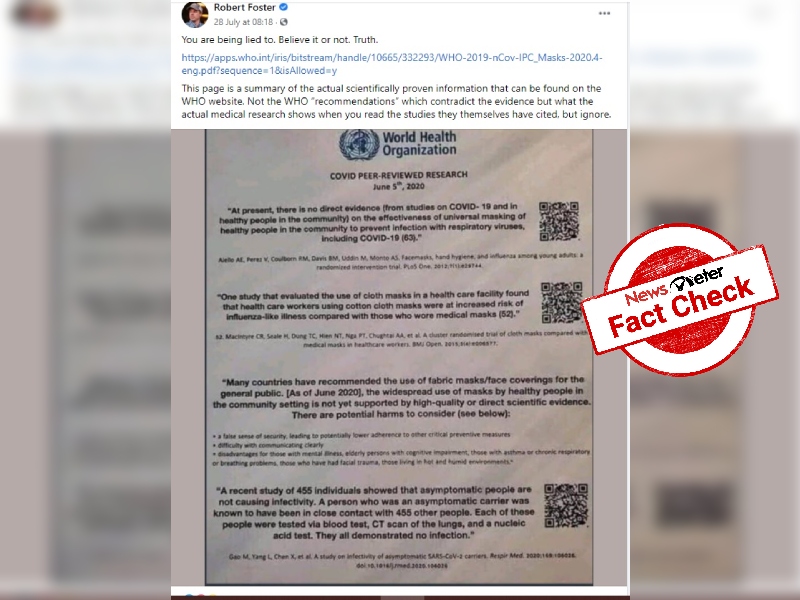FACT CHECK: Claims that WHO does not recommend wearing masks during COVID-19 are False.
By Newsmeter Network
Hyderabad: A purported World Health Organization (WHO) notice has become viral on social media. Invoking scientific research, the notice claims that WHO does not recommend wearing masks during the COVID-19 pandemic.
This image was shared on Facebook and twitter by multiple people. One such Facebook post by Robert Foster, an American politician, read," You are being lied to. Believe it. Truth. https://apps.who.int/iris/bitstream/handle/10665/332293/WHO-2019-nCov-IPC_Masks-2020.4-eng.pdf?sequence=1&isAllowed=y.
This page is a summary of the actual scientifically proven information that can be found on the WHO Website. Not the WHO recommendations which contradict the evidence but what the actual medical research shows when you read the studies they themselves have cited, but ignore ".
This post has notched 500 shares.
This publication claims the following:
1. There is no direct evidence on the effectiveness of universal masking to prevent infection.
2. Health care workers using cotton cloth masks are at an increased risk of influenza-like illness.
3. Wearing a mask may provide the general public with a false sense of security and can be a difficulty in communication.
4. Study of 455 individuals showing that asymptomatic people are not causing infectivity.
This claim has been shared by others too.
Archive of the claims can be found here and here.
FACT CHECK:
Newsmeter scanned the barcode available beside each claim in the post and found that this publication is a HOAX. No such publication was released by the World Health Organization. These research articles have been taken out of context from other research documents.
Margaret Harris, a WHO spokeswoman told AFP: "This is not a WHO document, but whoever has created it has cherry-picked some materials out of context from some WHO documents."
CLAIM 1:
There is no direct evidence on the effectiveness of universal masking to prevent infection
With the help of the barcode given in the post, it was found that this claim was shared from the 2012 study "Facemasks, Hand Hygiene, and Influenza among Young Adults: A Randomized Intervention Trial."
This study was conducted during the 2007–2008 influenza seasons, and not the COVID-19 pandemic. Its objective was to "examine if the use of face masks and hand hygiene reduced rates of influenza-like illness (ILI) and laboratory-confirmed influenza in the natural setting".
WHO suggests that wearing a medical mask is one of the prevention measures to?
Limit the spread of certain respiratory diseases, including 2019- nCoV, in affected areas.
This measure must be combined with hand hygiene and other IPC measures as well.
The US Center for Disease Control and Prevention (CDC) also recently pointed to a study which found that universal mask-wearing helped to mitigate the spread of the coronavirus in a Missouri hair salon where two hairstylists came into contact with 139 clients before realizing they were symptomatic and due to the mask no clients were known to become infected.
CLAIM 2:
Health care workers using cotton cloth masks were at an increased risk of influenza-like illness.
This claim was shared from a 2015 study: "A cluster-randomized trial of cloth masks compared with medical masks in healthcare workers." This study was aimed to compare the efficacy of cloth masks to medical masks in the hospital healthcare workers concerning clinical respiratory illness, influenza-like illness and laboratory-confirmed respiratory virus infection.
WHO released a video on its official YouTube channel and has added the viral on its website where it states that the inner layer of the mask is to be of a hydrophilic material such as cotton to reduce the risk of being infected by COVID19.
CLAIM 3:
Wearing a mask may provide the general public with a false sense of security and can be a difficulty in communication
This claim has been written without a study for reference. It claims that it is a problem while communicating. It should be noted that this reason is baseless as an individual's health is the top priority and communication can still take place with the mask on. In case of any health problem, it is recommended to change the fabric of the mask and visit a doctor.
For people living in hot and humid situations, according to 'The Inquirer', it is recommended to select a material like cotton, to ensure the mask sits well on the face, to carry extra masks and to moisturize the skin to breathe freely.
CLAIM 4:
Study of 455 individuals showing that asymptomatic people are not causing infectivity.
This claim is shared from a 2020 study titled: "A study on infectivity of asymptomatic SARS-CoV-2 carriers." The study concluded that all 455 individuals were excluded from SARS-COV-2 infection and that the infectivity of some asymptomatic SARS-CoV-2 carries might be weak.
However, The Harvard Global Health Institute told STAT, "All of the best evidence suggests that people without symptoms can and do readily spread SARS-CoV-2, the virus that causes Covid-19. In fact, some evidence suggests that people may be most infectious in the days before they become symptomatic — that is, in the presymptomatic phase when they feel well, have no symptoms, but may be shedding substantial amounts of virus."
Therefore with all the above information, it is safe to say that the post is a hoax and is not published by WHO. The link provided in the post is updated scientific evidence relevant to the use of masks for preventing transmission of Coronavirus disease 2019.
Thus, the claims that the global health body does not recommend wearing masks during the COVID-19 pandemic are FALSE.
This fact check has been published as part of the Internews Information Saves Lives: Rapid Response Fund project to NewsMeter